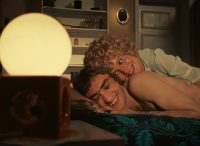
Newsletter February 2018

In the coming weeks Fassbinder will once again be very much the flavor of the month in the USA. Between 14 and 27 March the Film Forum in New York is screening the restored version of RWF’s working-class TV series EIGHT HOURS DON’T MAKE A DAY. The series is being presented in three parts, which can be viewed over different days or on the weekend in a marathon screening. More information about screening times and ticket prices can be found at: https://filmforum.org/film/eight-hours-dont-make-a-day-film
The Film Forum in Manhattan has existed as a nonprofit cinema since 1970. With its three screens and screenings 365 days a year it remains one of the most important venues for independent film and auteur cinema in the USA. The Forum has been directed by Karen Cooper since 1972. Its program is curated by Bruce Goldstein. And while in the age of streaming other cinemas are being forced to close their doors, the Film Forum is actually getting an additional screen this year. More information about the planned extension can be found in the following article from the New Yorker: https://www.nytimes.com/2017/09/04/movies/film-forum-new-york-city-upgrade.html
From 11 April to 13 May Fassbinder’s work will also be on show for both new and old fans at a cinema that can look back on a far longer history. Founded by the film archivist Henri Langlois and the director Georges Franju, the Cinémathèque Française is screening a complete RWF retrospective, an event that last took place in Paris at the Centre Pompidou in 2005.The film critic Jean-François Rauger is curating the series of screenings in collaboration with the distributor and home-cinema enterprise Carlotta Films, with which the Fassbinder Foundation has worked for many years. Carlotta Films was founded in 1998 by Jean-Pierre Gardelli and Vincent Paul-Boncour. A short interview with the latter about his distribution operation can be found at: https://festival.ilcinemaritrovato.it/il-cinema-ritrovato-book-fair-interview-with-vincent-paul-boncour-carlotta-films
The theater critic C. Bernd Sucher has written a book containing 49 “passionate” film recommendations. It includes a chapter devoted to Fassbinder’s QUERELLE, in which he writes: “It is not what happens that is significant but the way it is depicted: desire, love, betrayal, murder. Fassbinder seeks distance, a kind of Brechtian alienation; this is why he filmed in the studio and not on a ship in Brest; this is why the film features a prosaic, commenting narrator; this is why it is never night, never day – the action is always illuminated by an ominous, orange light […] With this film, Fassbinder discusses what life is and whether a free life is even possible.” The book is coming out in German on 1 March and can be purchased on the website of its publisher Droemer Verlag: https://www.droemer-knaur.de/buch/9558479/suchers-welt-film
A number of Fassbinder’s contemporaries feature in Dominik Graf and Johannes F. Sievert’s documentary OFFENE WUNDE DEUTSCHER FILM (German film: the open wound). The film deals with a more boisterous, volatile and daring national cinema than found today but one that the broader public hardly knows of. The many interviewees in the film include the producer Arthur Brauner, directors such as Klaus Lemke, Eckhart Schmidt and Roland Klick, and the actor Mario Adorf. All of them talk about the range of possibilities that were available in the 1960s and 1970s and discuss why film-makers in Germany now seem to find it so difficult to produce exciting television and sophisticated genre cinema. The German TV broadcaster is showing the film on 5 March and 11 p.m.
In conclusion we have some sad news: On 13 February the German director and stage designer Wilfried Minks died at the age of 87. His work in the 1960s with artistic director Kurt Hübner and director Peter Zadek at Theater Bremen, in particular, remains legendary. The so-called Bremen Style, which Minks helped create, was cool, minimalistic and orientated more towards contemporary art than theatre. Minks also worked with Fassbinder in 1971 on a production of “Bremen Freedom,” for which he transformed the performance area into a black cross.
We wish our friends and readers a pleasant conclusion to the winter and will return at the end of March with more news from the world of Rainer Werner Fassbinder.
Photo left: BREMER FREIHEIT © Detsches Theatermuseum München/Ilse Buhs
Photo right: ACHT STUNDEN SIND KEIN TAG © Rainer Werner Fassbinder Foundation